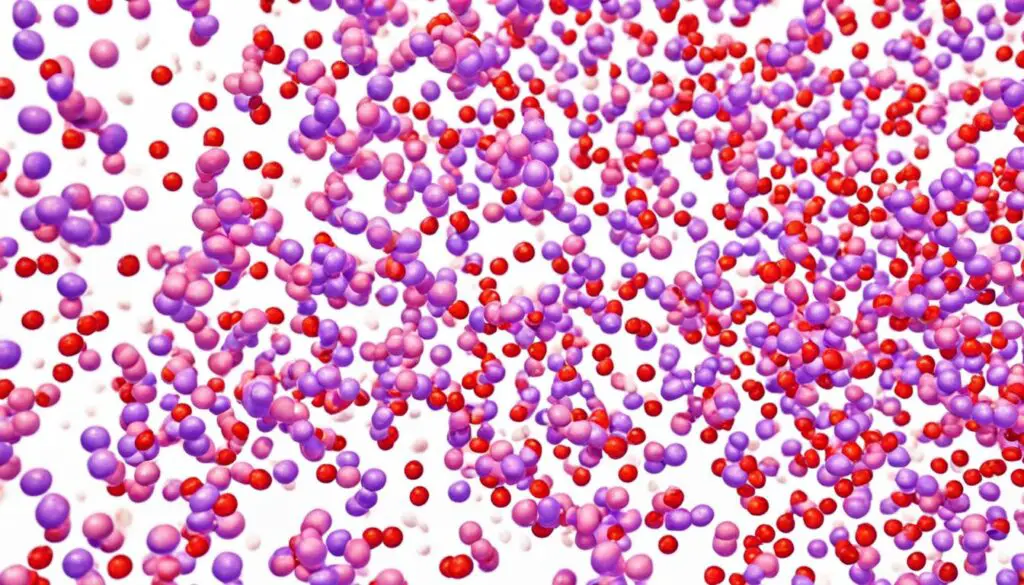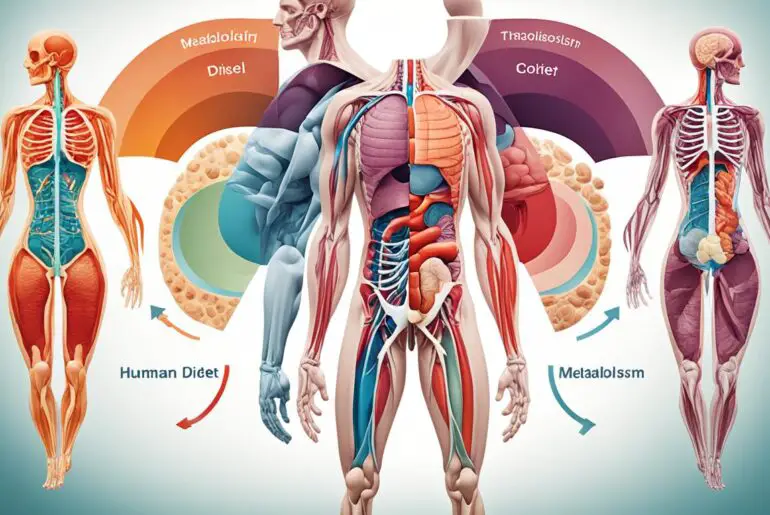Did you know that the HCG diet, a weight management program that promises rapid weight loss, is deemed unsafe and ineffective by the Food and Drug Administration (FDA)?
The HCG diet has gained popularity for its claim of significant weight loss in a short amount of time. However, it is important to understand the potential risks and limitations associated with this controversial diet.
The HCG hormone, produced during pregnancy, is used as a prescription medication for fertility issues, not for weight loss. The diet involves severe calorie restriction, typically around 500 to 800 calories a day, which can lead to short-term weight loss. However, such low calorie diets come with risks, such as gallstone formation, irregular heartbeat, and nutrient deficiencies.
In this article, I will delve into the safety and effectiveness of the HCG diet, how it works, its rules and limitations, the presence of scam products in the market, and whether it is recommended for long-term weight loss.
Key Takeaways:
- The HCG diet is deemed unsafe and ineffective by the FDA for weight loss.
- Severe calorie restriction can lead to risks and side effects such as gallstone formation and nutrient deficiencies.
- Weight loss on the HCG diet is primarily due to the extreme calorie restriction, not the HCG hormone itself.
- The HCG diet has specific rules regarding calorie intake and approved foods.
- There are scam products on the market claiming to be related to the HCG diet.
Is the HCG diet safe and effective?
The HCG diet has been a subject of debate when it comes to its safety and effectiveness. Let’s explore the facts and concerns surrounding this weight loss program.
The FDA’s Stance
The Food and Drug Administration (FDA) has discouraged the use of over-the-counter HCG weight-loss products, labeling them as unlawful and potentially hazardous. The FDA has only approved the use of HCG medications for prescribed treatments related to fertility, not for weight loss purposes.
The Risk of Severe Calorie Restriction
Severe calorie restriction is a fundamental component of the HCG diet. While this approach might lead to short-term weight loss, it can also pose significant risks and side effects.
One of the primary concerns is the potential formation of gallstones. The limited calorie intake can disrupt the normal functioning of the gallbladder, leading to the development of these painful stones.
Irregular heartbeat is another risk associated with severe calorie restriction. When the body is deprived of essential nutrients, it can negatively impact the heart’s rhythm, resulting in irregular heartbeats.
Nutrient deficiencies are a common consequence of severely restricted diets. Since the HCG diet limits calorie intake to 500-800 calories per day, it becomes challenging to acquire all the necessary nutrients for optimal health.
Fluid buildup is also a potential side effect of the HCG diet. When the body is deprived of adequate calories and hydration, it may respond by retaining water, leading to fluid buildup.
Furthermore, research has suggested a possible link between the HCG diet and an increased risk of cancer. Although more studies are needed to establish a definitive connection, it is imperative to consider this potential risk.
Safer Alternatives
Given the potential risks and lack of scientific evidence supporting its effectiveness, it is crucial to explore safer alternatives for weight loss. Consulting with a healthcare provider can help guide individuals towards healthier and more sustainable methods.
In conclusion, the safety and effectiveness of the HCG diet remain questionable. The FDA advises against the use of over-the-counter HCG products, and severe calorie restriction can lead to various risks and side effects. Considering safer approaches for weight loss is essential to prioritize overall well-being.
How does the HCG diet work?

The HCG diet is a weight loss program that combines severe calorie restriction with the use of HCG hormone injections or homeopathic products. Advocates of the HCG diet claim that the hormone stimulates metabolism and facilitates rapid weight loss without hunger. However, scientific studies have found that the main mechanism behind weight loss on the HCG diet is the extreme calorie restriction, not the HCG hormone itself.
When following the HCG diet, individuals typically consume around 500 calories per day. This drastic reduction in calorie intake forces the body to burn stored fat for energy, resulting in weight loss. However, it’s important to note that this level of calorie restriction is highly unsustainable and can have negative effects on the body.
While supporters of the HCG diet believe that the hormone suppresses hunger and prevents muscle loss, scientific evidence does not support these claims. Studies have shown that the HCG hormone does not significantly reduce appetite or preserve muscle mass during periods of severe calorie restriction.
Moreover, the severe calorie restriction associated with the HCG diet can lead to decreased muscle mass and a slowed metabolism. This can make it challenging to maintain the weight loss achieved through the diet in the long term.
The role of HCG hormone in the HCG diet
“Weight loss on the HCG diet is primarily attributed to the severe calorie restriction, not the HCG hormone itself.”
In conclusion, the HCG diet works by imposing severe calorie restriction, leading to weight loss through the body’s utilization of stored fat for energy. The HCG hormone itself does not play a significant role in the weight loss mechanism and does not prevent hunger or muscle loss. It’s important to consider the potential risks and limitations of the HCG diet before embarking on this weight loss journey. Consulting with a healthcare professional is essential to ensure the safety and effectiveness of any weight loss program.
What are the rules of the HCG diet?
The HCG diet follows a specific set of rules to maximize its effectiveness. It consists of three phases: the loading phase, weight loss phase, and maintenance phase.
The Loading Phase:
The loading phase, also known as the “gorging” phase, lasts for two days. During this phase, individuals are encouraged to eat high-calorie, high-fat foods to build up their fat reserves.
The Weight Loss Phase:
The weight loss phase is where strict calorie restriction comes into play. Individuals are limited to consuming only 500 calories per day. The main objective of this phase is to trigger rapid weight loss.
During the weight loss phase, individuals are allowed to eat two meals a day, typically lunch and dinner. Each meal must include:
- A portion of lean protein
- A vegetable
- A piece of bread
- A serving of fruit
Approved sources of lean protein on the HCG diet include veal, beef, chicken breast, white fish, lobster, crab, and shrimp. Vegetables such as spinach, tomatoes, celery, and cabbage are also approved. However, it is important to avoid certain types of fish, such as salmon, eel, and tuna.
Butter, oils, and sugar are not allowed on the HCG diet. However, unlimited amounts of water, coffee, and tea can be consumed.
The Maintenance Phase:
The maintenance phase is the final phase of the HCG diet. It typically lasts for three weeks. During this phase, individuals gradually increase their calorie intake and transition back to a more balanced diet. It is essential to follow specific guidelines to ensure long-term weight maintenance.
Adhering to the rules of the HCG diet is crucial for achieving the desired results. Remember to consult with a healthcare provider before starting any diet or weight loss program.
Are there any safety concerns with the HCG diet?
The HCG diet has raised significant safety concerns, prompting the intervention of the Food and Drug Administration (FDA). The regulatory body has actively questioned the safety of this weight loss program and has taken action against companies selling over-the-counter HCG products without proper authorization.
When following the HCG diet, individuals may experience a range of side effects. These can include headaches, depression, and fatigue, which can greatly impact day-to-day functioning and overall well-being. It’s important to note that severe calorie restriction, a characteristic feature of the HCG diet, can have serious health consequences.
One of the primary concerns associated with severe calorie restriction is the risk of nutrient deficiencies. With an extremely limited calorie intake, individuals may not obtain the necessary vitamins, minerals, and other essential nutrients needed for optimal health. This can lead to various health issues, including weakened immune function and a compromised ability to heal.
Gallstone formation is another potential risk of the HCG diet. Rapid weight loss, combined with reduced calorie intake, can disrupt the normal balance of cholesterol and bile in the gallbladder, increasing the likelihood of gallstone development. These painful stones can lead to severe complications, such as gallbladder inflammation or blockages.
Furthermore, the HCG diet’s severe calorie restriction can have significant effects on the heart, potentially resulting in an irregular heartbeat. This is particularly concerning for individuals with underlying heart conditions or those who are at a higher risk of cardiovascular problems.
In rare cases, the HCG diet has been associated with serious complications such as blood clots. While these occurrences are infrequent, it is crucial to consider all potential risks before embarking on this weight loss program.
It is essential to consult with a qualified healthcare professional before starting any weight loss program, including the HCG diet. They can provide personalized guidance, taking into account your individual health status and risk factors. Your healthcare provider can also help you explore safer and more effective weight loss methods tailored to your specific needs.
Expert Quote:
“The safety concerns surrounding the HCG diet underline the need for caution. The potential side effects and health risks associated with severe calorie restriction and unregulated HCG products warrant careful consideration. It is always advisable to consult with a healthcare professional for guidance and support during your weight loss journey.”
– Dr. Jane Doe, MD, Dietitian
For a comprehensive understanding of the potential health risks and side effects of the HCG diet, it is crucial to consult with medical professionals who can provide evidence-based guidance and ensure your safety throughout your weight loss journey.
What are the limitations of the HCG diet?

The HCG diet, while promising rapid weight loss, comes with several limitations that individuals should consider before embarking on the program. The most prominent limitation is the severe calorie restriction, with a daily intake of only 500 calories. Sustaining such a low-calorie diet can be challenging and may lead to nutrient deficiencies.
Meeting all nutritional needs on such a restricted calorie intake is difficult, particularly for individuals following vegan or vegetarian diets. These individuals may struggle to obtain adequate protein, which plays a crucial role in supporting overall health and satiety.
It is important to note that the HCG diet is not suitable for individuals with gluten intolerance or those following a gluten-free diet. The diet includes bread as part of the meal plan, which contains gluten. Individuals with gluten sensitivity or celiac disease should explore other weight loss options that align with their dietary needs.
In addition to calorie and dietary restrictions, the HCG diet has specific rules that must be followed. Approved foods must be carefully adhered to, and the use of butter, oils, and sugar is restricted. While water, coffee, and tea are allowed in unlimited amounts, the diet’s rigidity may present challenges for individuals accustomed to more flexibility in their eating habits.
It is essential to consider these limitations and evaluate whether the HCG diet aligns with individual preferences, dietary needs, and overall lifestyle. Sustainable weight loss methods that prioritize balanced nutrition and long-term adherence may be more suitable for individuals seeking safe and effective weight loss outcomes.
Sample Table: Approved Foods on the HCG Diet
| Protein | Vegetables | Bread | Fruit |
|---|---|---|---|
| Veal | Spinach | 1 piece | 1 serving |
| Beef | Tomatoes | ||
| Chicken breast | Celery | ||
| White fish | Cabbage | ||
| Lobster | |||
| Crab | |||
| Shrimp |
Are there scam products on the market?
When it comes to the HCG diet, it’s essential to be aware of the presence of scam products on the market. Many unscrupulous companies claim to offer HCG-related products, but they are often nothing more than scams. These products, often labeled as homeopathic and available over-the-counter (OTC), do not contain any genuine HCG hormone and are not regulated by the FDA.
It is crucial to exercise caution when considering these products, as they may contain unknown or potentially harmful ingredients. To ensure your safety and the effectiveness of any HCG products, it is best to consult with a healthcare provider and obtain genuine HCG injections with a prescription.
Scam products claiming to be related to the HCG diet can pose a significant risk to your health and well-being. By avoiding these unregulated and potentially dangerous products, you can protect yourself and make informed choices for your weight loss journey.
Is the HCG diet recommended for long-term weight loss?

The HCG diet is not recommended as a long-term weight loss solution. The diet’s extreme calorie restriction and lack of scientific evidence supporting its effectiveness make it unsustainable for extended periods. While individuals may experience significant weight loss in the short term, maintaining this weight loss proves challenging due to the low calorie intake and potential muscle loss.
For sustainable and successful weight loss, it is essential to adopt proven methods such as a balanced diet, regular exercise, and healthy lifestyle habits. Working closely with a healthcare provider will enable the development of a personalized weight loss plan that is safe, effective, and sustainable in the long term.
Why the HCG diet falls short for long-term weight loss
The HCG diet’s extreme calorie restriction of 500-800 calories a day is not a sustainable approach for long-term weight loss. Severely limiting calorie intake can lead to nutrient deficiencies, low energy levels, and a slowed metabolism, making it difficult to maintain weight loss over time.
Additionally, the HCG diet’s reliance on the HCG hormone has no proven impact on weight loss beyond what can be attributed to the low calorie intake alone. The hormone does not significantly reduce hunger or prevent muscle loss, as some proponents of the diet suggest.
Opting for healthier and sustainable methods allows for gradual and long-lasting weight loss. These methods focus on nourishing the body with a nutrient-rich diet, engaging in regular physical activity, managing stress levels, and practicing mindful eating habits.
The importance of sustainable weight loss methods
Sustainable weight loss requires a holistic approach that considers not just short-term results but also long-term health and well-being. Restrictive diets like the HCG diet may yield rapid initial weight loss, but they often result in weight regain once normal eating habits are resumed.
A balanced diet that includes a variety of nutrient-dense foods helps to support overall health and maintain a healthy weight. Regular exercise, such as cardiovascular workouts and strength training, strengthens muscles, boosts metabolism, and promotes calorie burn.
It is crucial to adopt healthy lifestyle habits that can be sustained in the long term. This includes getting adequate sleep, managing stress levels, staying hydrated, and engaging in positive self-care practices. These habits contribute to overall well-being and help maintain a healthy weight.
In conclusion, while the HCG diet may offer rapid weight loss in the short term, it is not a recommended long-term weight loss solution. Embracing sustainable methods such as a balanced diet, regular exercise, and healthy lifestyle habits promotes overall well-being and leads to more successful and lasting weight loss results.
Conclusion
After careful evaluation, it is clear that the HCG diet is not a safe or effective method for rapid weight loss. The FDA has strongly cautioned against the use of HCG hormone injections or homeopathic products for weight loss, as they can lead to various health risks and side effects. Severe calorie restriction, a key component of the HCG diet, can result in nutrient deficiencies, gallstone formation, irregular heartbeat, and fluid buildup.
Instead of resorting to potentially harmful methods like the HCG diet, it is recommended to adopt safer weight loss approaches. A balanced diet, regular exercise, and lifestyle changes are essential for natural and sustainable weight loss. These methods focus on long-term success and overall well-being rather than quick fixes.
When embarking on a weight loss journey, it is always important to consult with a healthcare provider. They can provide personalized guidance, develop a safe and effective weight loss plan, and monitor your progress. Remember, achieving a healthy weight is not about drastic measures but about making consistent, lifestyle changes that promote lasting well-being.
FAQ
Is the HCG diet safe and effective?
The HCG diet has been deemed unsafe and ineffective by the FDA. Severe calorie restriction and the use of HCG hormone injections or homeopathic products can lead to various health risks and side effects. Safer methods for weight loss include a balanced diet, regular exercise, and lifestyle changes that promote natural and sustainable weight loss.
How does the HCG diet work?
The HCG diet involves severe calorie restriction, typically around 500 calories a day. Supporters claim that HCG boosts metabolism and leads to rapid weight loss without hunger. However, scientific studies have found that weight loss on the HCG diet is solely due to the extreme calorie restriction and not the HCG hormone itself.
What are the rules of the HCG diet?
The HCG diet is divided into three phases: loading phase, weight loss phase, and maintenance phase. During the weight loss phase, individuals are restricted to 500 calories per day and are allowed to eat two meals, usually lunch and dinner. Each meal must include a portion of lean protein, a vegetable, a piece of bread, and a serving of fruit. Approved foods include veal, beef, chicken breast, white fish, lobster, crab, spinach, tomatoes, celery, cabbage, and certain fruits. Butter, oils, and sugar are not allowed.
Are there any safety concerns with the HCG diet?
Yes, there are safety concerns with the HCG diet. The FDA has questioned the safety of the diet and has sent warning letters to companies selling over-the-counter HCG products. Side effects can include headaches, depression, fatigue, gallstone formation, irregular heartbeat, and nutrient deficiencies. In rare cases, blood clots and other serious complications have been reported.
What are the limitations of the HCG diet?
The severe calorie restriction of the HCG diet (500 calories per day) is difficult to sustain and can lead to nutrient deficiencies. It may be challenging for vegetarians and vegans to meet their protein needs. The HCG diet is not gluten-free and includes bread as part of the meal plan. The diet also restricts the use of butter, oils, and sugar.
Are there scam products on the market?
Yes, there are scam products on the market claiming to be related to the HCG diet. Most of these products are labeled as homeopathic and are available over-the-counter (OTC). However, they do not contain genuine HCG hormone and are not regulated by the FDA. Genuine HCG injections can only be obtained with a prescription from a healthcare provider.
Is the HCG diet recommended for long-term weight loss?
No, the HCG diet is not recommended for long-term weight loss due to its extreme calorie restriction and lack of scientific evidence supporting its effectiveness. Sustainable methods for weight loss involve a balanced diet, regular exercise, and healthy lifestyle habits. It is important to work with a healthcare provider to develop a personalized weight loss plan that is safe, effective, and sustainable in the long term.




